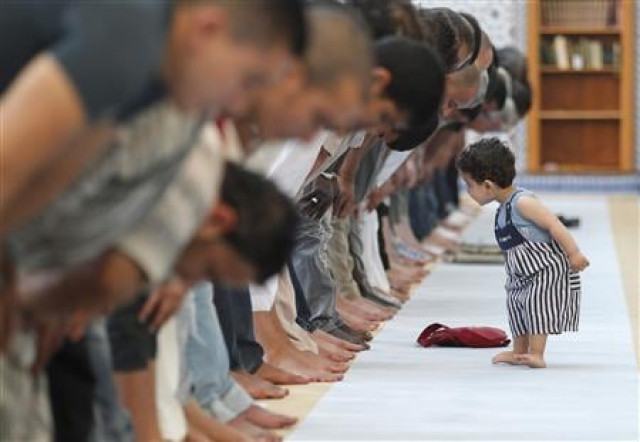More and more Muslims
Pakistani Hindus are calling for help. We cannot continue to look the other way

Representational image. PHOTO: REUTERS
A trip last week to Ranikot, the famous fort located near the town of Sann, once again illustrated how the province is changing. There is a distinct air of change in the socio-political set-up of the province - not just in terms of the mosques and madrassas that one sees along the highway but the graffiti on the walls and the appearance of the locals.
Possibly one of the biggest victims of the new brand of Islam are Sindh’s religious minority communities. It is estimated that Hindus comprise 6 per cent of the total population of the province, a figure that cannot be independently verified given that the census data does not tell us about the various religious communities in the country.
Over the years, the Hindus have been marginalised as their role in Pakistan is questioned despite the fact that they are the original inhabitants of this land.
I was saddened when I read a column by my friend Kapil Dev, who once wrote that during the cricket World Cup in 2011, “many who knew that I am a Hindu, including some of my colleagues, asked me who I would support India or Pakistan.”
“I didn’t understand why on earth they would ask me such a stupid question – just because I’m Hindu. Why isn’t the same question asked of a Christian when Pakistan plays against Australia, England or New Zealand,” he asks.
But the problems don’t end there. When it comes to cases of forced conversion, these are mostly reported from Sindh. Although Pakistan became a Muslim-majority state post-partition — with Muslims dominating politics, the economy, and society — Hindus managed to retain a degree of social influence in the Sindh province, where they are seen as successful merchants. But that seems to be changing now.
At the same time a number of lower-caste and low-income Hindus in Sindh continued to toil on farmlands for powerful, rich landowners, many of them in some sort of bonded labour arrangement. They face social discrimination and are often cut off from the Hindu community at large.
A 2015 report by the South Asia Partnership-Pakistan argued that social, cultural, economic, and religious factors have combined with feudal power structures in rural areas to enable forcible conversions. A whole system is in place to ensure this practice - from the connivance of the police to the no-questions-asked policy of some custodians of religious shrines where this is done. By the time the girl is produced in court, it is already too late.
In November 2016, the Sindh Assembly unanimously passed a bill against forced conversion of religion in the province. The private bill, Criminal Law (Protection of Minorities), was tabled by Pakistan Muslim League-Functional (PML-F) lawmaker Nand Kumar in 2015. It was referred to the standing committee on minority and human rights for feedback and then returned to the assembly.
But one month later, the Sindh government decided to review the bill after religious scholars objected to some of its clauses. The decision was indicated in a policy statement issued by Senior Minister for Parliamentary Affairs Nisar Ahmad Khuhro. Muslim religious scholars believed some of its clauses were against the teachings of Islam and contrary to the Constitution.
The state’s attitude, as well as that of many eminent Muslims, is that conversions are actually a form of earning blessings. Needless to say that the conversions are often backed by powerful shrines, seminaries, and clerics, as well as local politicians. Seminaries and shrines protect the couple and say the girl willingly eloped, converted, and married.
This poses a challenge for lawyers and activists, who have to figure out if these marriages are born of free will or are marked by threats and violence. And almost invariably, the girl’s testimony that she exercised her right as an adult to marry settles the case, while her parents continue to insist she is being pressured by the influential followers of the shrine where she converted to Islam.
How long can this go on? Pakistani Hindus are calling for help. We cannot continue to look the other way.
Published in The Express Tribune, February 12th, 2018.
Like Opinion & Editorial on Facebook, follow @ETOpEd on Twitter to receive all updates on all our daily pieces.














COMMENTS
Comments are moderated and generally will be posted if they are on-topic and not abusive.
For more information, please see our Comments FAQ